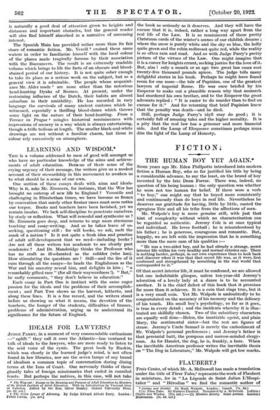LEARNING AND WISDOM.*
Tars is a volume addressed to men of good will amongst us who have no particular knowledge of the aims and achieve- ments of adult education. Because of their sense of the crying urgency of their message, the writers give us a modest account of their stewardship in this movement to awaken us to what should be a sense of our own.
One section of these essays deals with aims and ideals- Why is it, asks Mr. Zimmern, for instance, that the War has brought no outcrop of new life to England ? Versatile and challenging in Elizabethan times; we have become so frozen by convention that surely other fresher races must soon notice our torpor. Books and teachers have been lavished, yet we remain insular. We lack self-discipline to penetrate ourselves, by study or reflection. What will remodel and synthesize us ? Mr. Zimmern goes deep, and returns to urge more strenuous teaching and essay-writing. And so he takes leave of us, seeking, questioning still : for will books, we ask, melt the mask of a nation ? Is it not quite a fresh idea and practice of adult self-development that we need—including books ? Are not all these writers too academic to see clearly past academics ? And Dr. Mansbridge thinks the Professor who has no craft as ill-educated as the cobbler (who has). How stimulating the questions are 1 Still—and the fire of it runs through all the essays—he lauds the Englishman as the War and his ancestry reveal him, and delights in him ; " a remarkably gifted race " (for all their waywardness I). " But," he sadly comments, " they don't believe in education."
Each essay in Part One is instinct with the same eager passion for the ideals and the problems of their accomplish- ment ; and Part Two shows us the harvest, hitherto, and along these lines. It is a fine record, and the writers stand before us showing us what it means, the devotion of the teachers, the hunger of the students, difficulties of finance, problems of administration, urging us to understand its significance for the future of England.










































 Previous page
Previous page